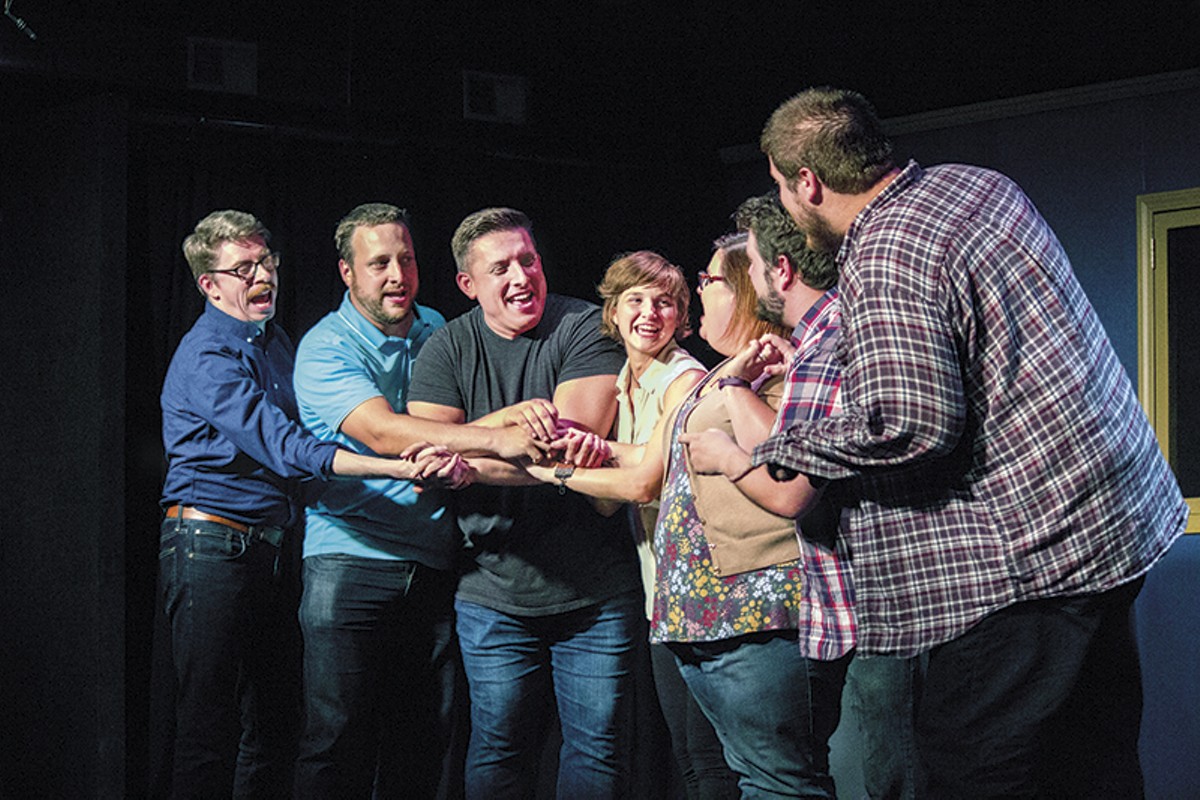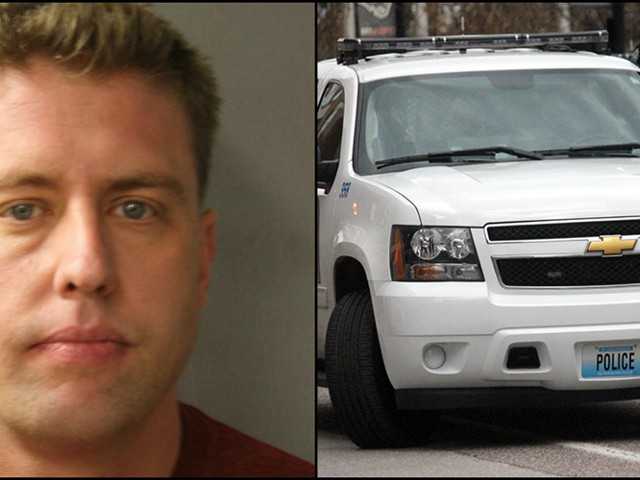Laurie's Place is an unassuming bar, grill and music venue in downtown Edwardsville, so regular as to be special. The joint features two barrooms, and the one in back has the kind of dark, windowless charm that makes you never want to leave on a hot summer afternoon. Twice a week, the man who last year was deemed the funniest person in St. Louis tends bar here, a longstanding gig he's held for about a dozen years, through countless life changes.
"Comedy pays my bills," Rafe Williams says. "But this is my insurance money. It helps out when some months are lean. I've kept this job through a lot of traveling, and Laurie's has always been supportive to my career. It's a security blanket, and I'm always out of here by six so that I can do all the shows I like."
Williams seems to have a story about every situation that comes across his path. Listening to him while he's bartending, you sense how the job is "complementary," as he says, to gigging in comedy clubs. "You're training your brain as a comedian: You have to have a natural inclination to note things and think on them in a funny way. Comedy comes from observations, and what better place is there to make them?"
As he knows most of the people who come through the door — a mix that includes lawyers, tradesmen, office workers and an occasional roustabout — Williams is quick with a quip, playfully jousting with a few, taking orders and talking to a reporter with his attention on his customers first. At times, they tell a story and he adds a piece, then starts in on a riff of his own. Such as: a lengthy take on his former roommate, a member of the national table tennis team of Barbados, who only bathed once a week and who would leave a line of grit in the tub that Williams can describe almost too vividly.
His regulars cackle a bit and throw in their two cents. The scene plays out through the noon lunch hour, at which point the spot is all but emptied out, just as he's predicted. Williams is clearly at home in this place, which might explain why he keeps showing up, even though every shift entails a 90-minute round-trip drive from his apartment in the city.
But Williams is comfortable in a variety of roles, places, situations, environments. In a world of specialists, he's a generalist, joyously so.
There's standup, of course, but also coursework taught at the Improv Shop and sketch-writing, too. He podcasts and has written ad copy for St. Louis institutions including Imo's and Purina. He's even working on a TV show through the auspices of Coolfire Media, a St. Louis company with a track record of placing reality television with networks. The show is in that delicate pre-production stage where no one is permitted to say much, though he will allow, "I've worked with the company on other commercial projects and they liked my personality and writing, so we collaborated to create a television concept. My role is the host and writer."
The guy behind the bar at Laurie's? The funny one? He's got a lot going on.
At 38, Williams is one of the older guys in St. Louis' coterie of working comedians. The gift that comes with that: perspective. Some young comics won't ask for advice — you know, 'cause they're young. Others will and, when they do, Williams channels Rich Talarico, a comedy writer known for his work with Key and Peele, among others.
"When people ask me how to get to the next level," Williams says, "I just tell them to crush the level you're at. When you crush the level that you're at, you're all of a sudden onto the next. It's like being on an elevator. There's no official rite of passage. You just start doing shows. You get a couple of good breaks. You host. You feature, which is the set in the middle of a show. Then, when you get the opportunity, you start to headline sets in small clubs."
Right now, Williams is at the point where, he says, "I'll stop and reflect on a year's body of work and think, 'A lot of stuff's happened.' Which feels good. Progress is incremental, as it would be in anyone else's life. I've done the East Coast, the South, the Midwest, LA. I've gone to New York to work with Improv4Humans and that was a really cool opportunity. I'm getting to the point where, hopefully, this will be the year to completely transition and schedule enough dates to be on the road for twenty weeks a year. A lot of it is just getting an opportunity, just like in any other business. And when you do, don't be an asshole. Be easy to work with, and when you do get the opportunity, deliver."
It's a comment that segues naturally into this Hallmark moment: "I really believe that if you open yourself up, that the universe will provide you good things. I know that sounds corny. You have to not worry about 'when' or 'how' you get it, but do what you love and surround yourself with good people. I think that's what people miss."
Williams has faced a few challenges, which have, in turn, provided creative stimuli. For example, he notes during one particularly hilarious on-stage bit that he became a grandfather — early. The son he had as a teenager himself became a dad at an even younger age, thus his status as a "pee-paw" by 36. It's a part of his act that consistently gets laughs and humanizes Williams instantly.
Drinking was an issue, too, and provided a test of his resolve to perform without it. "When I quit drinking and had to do it without alcohol, it was crippling," he acknowledges. "I did Toastmasters. I did every kind of improv."
But, he says, it was his decision to stop, in 2011, that allowed him to take his comedy seriously. "You realize that there's a difference between the lion that's going to eat you and the lion that's not. And I think a lot of people aren't able to make that determination. It's societal, though. There's such a deep-seated, innate fear of expressing yourself, which is what so many people feel."
Feelings? He has them.
In his sets, Williams passes along the perception that he looks like "a meathead." Letting the audience in on the idea that looks are deceiving, and confirming that he's anything but that meathead, Williams opens up to his audience about what they're going to get going forward. Meatheads typically don't come up with self-deprecating phrases like "you have to make failure your vitamin" or thoughtful nuggets like "comedy can be relatable or edgy, but what's common is that you're trying to get an involuntary reaction, laughter, out of someone, and you can get to that same end point by taking very different roads."
Says Williams, "If you're an angry-looking man and don't call that out, it's all the audience is going to be thinking about."






